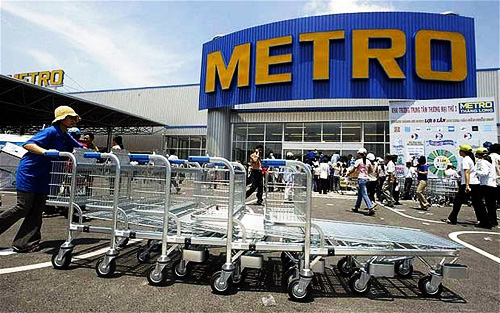Metro Group involved in imported goods forgery case
- By Li Jingrong
 0 Comment(s)
0 Comment(s) Print
Print E-mail China.org.cn, July 15, 2015
E-mail China.org.cn, July 15, 2015
|
|
|
A Metro branch. [File photo] |
Three employees of a Shanghai food trading company -- Shanghai Youzilang Industrial Co. Ltd -- were sentenced to three years of jail by the local Minhang District Court for forging more than 2,000 "hygiene certificates" on imported products over the past two years. The case also involved Germany-based Metro Group, Chinanews.com reported.
The Shanghai Entry-Exit Inspection and Quarantine Bureau revealed Monday that, the Youzilang Company had bought the imported food, pasted on fake "hygiene certificates," and supplied them to the Metro Jinjiang Cash & Carry Co in Shanghai as well as 80 branches of the Metro chain around China.
The authorities said they would investigate other cases of a similar nature and promised to take stricter measures to crack down on counterfeiting, ensure food safety, and protect consumers' rights and interests.
China's entry-exit inspection and quarantine authorities issue "hygiene certificates" and related documents as a prerequisite for imported food to be sold on the Chinese mainland. Food operators are required to check the certificates when they purchase the imported goods and must also keep a record of them.
The Shanghai Entry-Exit Inspection and Quarantine Bureau had been checking the documents at Metro's Jinjiang Cash & Carry Co in Shanghai since last year. Some of the products with fake certificates found at Metro's supermarkets were easy to detect as the issuing date was earlier than the production date and the weight of the same batch of products on a single certificate was different.
For example, on a fake "hygiene certificate," the same batch of goods appeared as two different weights (11,500 kg and 11,640 kg) and different numbers (95 cases and 1,400 cases). Many fake "hygiene certificates" shared one serial number that was registered by different cargo receivers, numbers of goods, and production dates.
During the investigation, law enforcement officers learned that Metro had a strict and advanced internal management system in which its global network not only had the columns of commodity names and commodity bar codes, but also has a special column for the "hygiene certificate" numbers of imported foods.
However, in the Shanghai case, the "hygiene certificate" numbers of imported foods were all displayed blank in the Metro e-system. One of its operating personnel said that this column had never been recorded.
Officers also found that while supplying commodities to Metro a company provided only a "letter of undertaking" instead of a "hygiene certificate." One of the company's quality inspection staff told them this approach involved was defaulted by the Metro management.
The inspection and quarantine authorities said the phenomenon had a certain universality, and some supermarkets even colluded with illegal businesses to use cheap domestic goods disguised as imported goods to be sold for huge profits.
The authorities said that, with the improvement of people's living standards and increasing demand for imported foods, ensuring food quality and safety had become increasingly important, requiring higher requirements for legalization of market supply and marketing channels.
The Metro Group is a German international retail and wholesale corporation based in Düsseldorf, Germany and one of the largest retail and wholesale corporations in the world.
Currently Metro still hasn't submitted its business accounting in connection with the Shanghai case to cooperate with the law enforcement authorities to make further judgment on whether the foods involved in the fake "hygiene certificates" posed any safety risk, it was reported.







Go to Forum >>0 Comment(s)